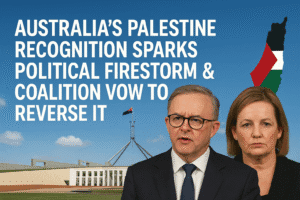Australia’s Palestine Recognition Sparks Political Firestorm & Coalition Vow to Reverse It
Australia’s political scene has erupted after Prime Minister Anthony Albanese confirmed the nation will formally recognise a Palestinian state at the UN General Assembly in September. The move, framed as part of a coordinated global push for a two-state solution alongside allies like the UK and France, drew immediate condemnation from Israeli Prime Minister Benjamin Netanyahu, who called it “shameful” and futile. Albanese accused Netanyahu of ignoring the humanitarian toll of the conflict, citing their tense recent phone call.
Within a day, Opposition Leader Sussan Ley vowed the Coalition would reverse the recognition if elected in 2028, arguing it undermines peace talks and disrespects the US role as mediator. Shadow Foreign Minister Michaelia Cash questioned recognising a state without defined borders or unified governance.
The decision shatters Australia’s decades-long bipartisan stance on the issue, igniting a fierce domestic political battle. Critics challenge the timing and unclear conditions attached to recognition. The upcoming UN vote will not only test Australia’s foreign policy but also shape the next federal election’s foreign affairs agenda.

Australia’s Palestine Recognition Sparks Political Firestorm & Coalition Vow to Reverse It
Sydney, August 13, 2025 – Australia’s political landscape is fractured over the Middle East after the Labor government’s landmark decision to recognise Palestinian statehood, met with fierce opposition vows to revoke it and escalating diplomatic tension with Israel.
The Decision & Immediate Backlash:
- Labor’s Move: Prime Minister Anthony Albanese confirmed Australia will formally recognise a Palestinian state at the upcoming United Nations General Assembly in September. He framed this as part of a “coordinated global effort” (including the UK, France, and Canada) to build momentum towards a two-state solution, citing deep “frustration” with Israeli leadership.
- Netanyahu’s Scorn: Israeli Prime Minister Benjamin Netanyahu launched a scathing attack before the official announcement, labelling Australia’s planned move “shameful” and accusing supporting nations of falling for a “canard.” He insisted recognition would not change Israel’s position, declaring, “We will not commit national suicide to get a good op-ed for two minutes.”
- Albanese’s Rebuke: Albanese revealed a tense phone call with Netanyahu last week, where he signaled Australia’s direction. He accused Netanyahu of being “in denial” about the war’s consequences on innocent civilians, stating the Israeli leader merely reiterated calls for more military action despite evidence it wasn’t producing peace.
The Coalition’s Counter-Pledge:
- Reversal Vowed: Within 24 hours of Labor’s announcement, Opposition Leader Sussan Ley issued a definitive statement: “The Coalition would have never made this call… and we do not agree with it.” She vowed that if elected at the next federal election (due in 2028), a Coalition government would revoke Australia’s recognition of a Palestinian state.
- Core Argument: The Coalition insists recognition should only come at the end of a “proper peace process,” linking it to the release of hostages held by Hamas and a final negotiated settlement. Ley argued the decision disrespects key ally the US, traditionally the primary broker in the region, and harms ceasefire prospects.
- Questioning Feasibility: Shadow Foreign Minister Michaelia Cash challenged the practical meaning of the recognition, asking: “What state is he recognising? You don’t recognise a new state until that state exists.” She highlighted the lack of agreed borders and the absence of a single Palestinian government in effective control of its territory as fundamental obstacles.
Domestic Political Rift & Lingering Questions: This move shatters a long-standing bipartisan consensus on Australia’s approach to Israel and Palestine. Key points of contention and unresolved issues include:
- Timing & Motivation: Albanese cited announcements from allies and Netanyahu’s reaction as factors solidifying the decision, despite stating weeks earlier recognition wasn’t “imminent.” Critics question the precise triggers and strategic calculations.
- Defining “Conditions”: While Albanese stated recognition is “conditional,” the Coalition and analysts demand clarity on what specific benchmarks the Palestinian Authority must meet after recognition and the consequences of failing them.
- International Fallout: Netanyahu’s vehement reaction underscores the diplomatic strain. How this impacts broader Australia-Israel relations and Australia’s role within Western diplomatic circles remains to be seen.
- Domestic Divide: Ley’s unequivocal pledge to reverse the decision sets up a clear three-year policy battle line, making Palestinian statehood a major foreign policy issue in the next election campaign.
What Happens Next: Australia will proceed with formal recognition at the UN in September, joining a growing cohort of Western nations. However, the domestic political guarantee that this recognition would be reversed under a change of government injects significant uncertainty into Australia’s long-term position and underscores the deep divisions the decision has exposed both internationally and at home. The focus now shifts to the diplomatic ramifications of the September vote and the evolving political debate within Australia.
You must be logged in to post a comment.